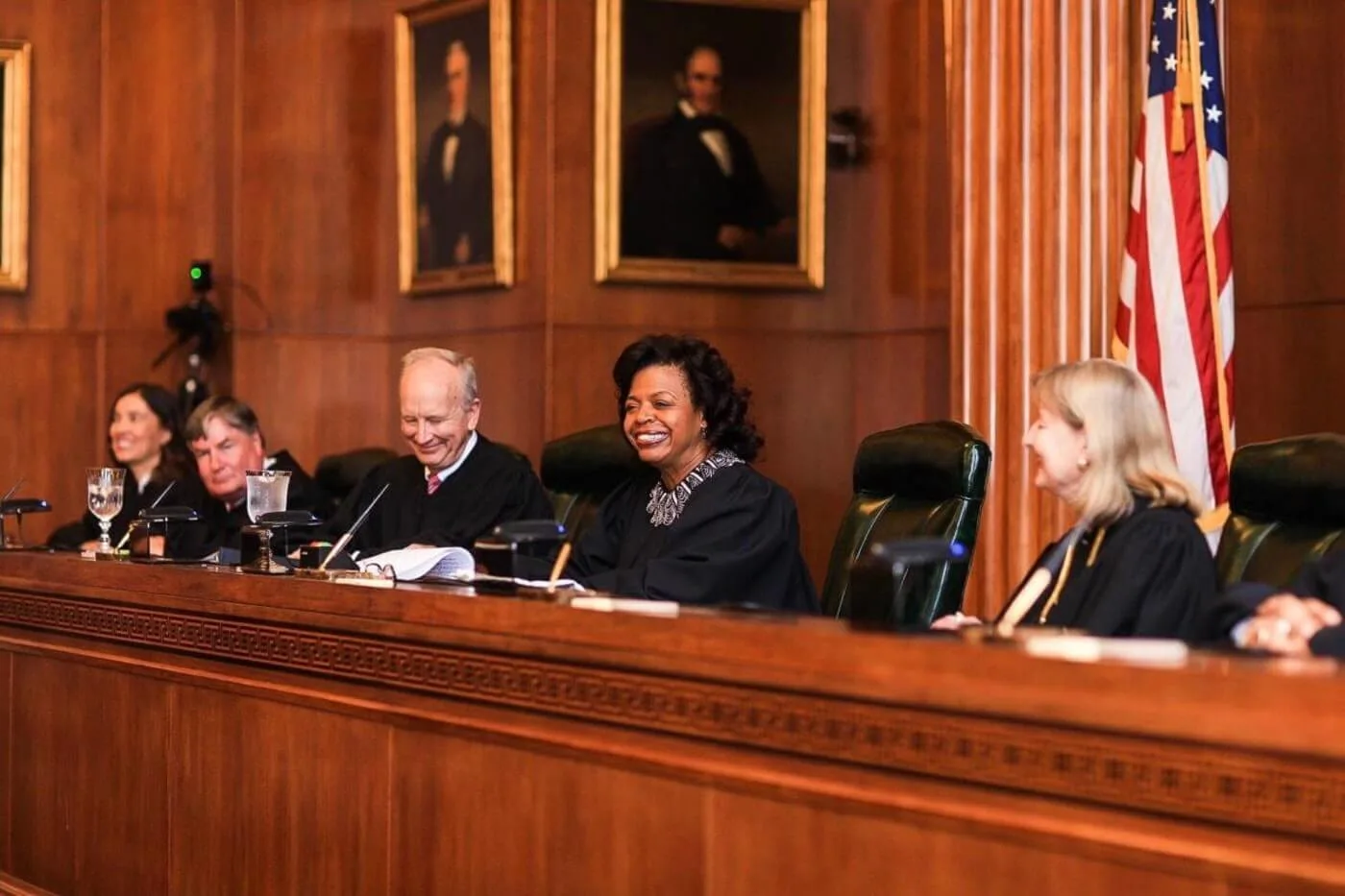
In most midterm election years, races for state supreme court seats are overshadowed by campaigns for governor or the Senate. Some Republicans, however, say the party’s priorities need to change.
The GOP’s focus on the makeup of state supreme courts escalated this week after a series of legal setbacks frustrated the party’s effort to redraw congressional maps in Pennsylvania and North Carolina. That prompted some leading Republicans to press the party to pay more attention to elections in November in which some supreme court justices will face voters.
“The top of the ticket where you have a governor’s race, Senate race, are important,” Chris Christie, the former New Jersey governor who leads the National Republican Redistricting Trust, told reporters this week. “But if you want your House districts to be determined in fair districts, you need to pay attention to your elected Supreme Courts.”
The comment, and the rulings that sparked it, shows how state courts are playing an increasingly high-profile role in the politically charged, once-a-decade redrawing of legislative lines. Legislatures typically control the process and can contort the lines to scoop up as many of their party’s voters as possible in as many districts as they can draw, a process known as gerrymandering.
Even in the best of circumstances, that process triggers an avalanche of litigation. But this cycle has fueled even intensity in the state courts because the conservative majority on the US Supreme Court ruled in 2019 that federal courts can’t rule on partisan gerrymandering cases. Race-based line-drawing is governed by a thicket of federal law and constitutional principles and federal courts can intervene in those cases. But for most redistricting legal battles, state courts are the last resort.
The GOP’s frustration with state courts escalated this week after the Democratic-majority Pennsylvania Supreme Court on Wednesday rejected the recommendations of a lower court to adopt a GOP-drawn map that reduced the number of Democratic-leaning House seats, despite the fact that Democrats largely represent the areas where the state’s population is growing. Instead, the high court picked a map drawn by Democratic plaintiffs that combined two Republican-held seats where population growth was particularly stagnant.
The same day, a panel of North Carolina judges ruled that a map drawn by that state’s GOP-controlled legislature didn’t comply with a 4-3 decision from the Democratic-controlled supreme court that found a similar map to illegally favor Republicans. The new map, drawn by court-appointed mapmakers and left intact later Wednesday by the state’s high court, may cost Republicans three House seats compared with the initial map they submitted, which made 10 of the state’s 14 seats safe for the GOP.
Despite the Republican criticism, state courts do not always rule on partisan lines.
The Republican chief justice of the Ohio Supreme Court, for instance, joined three Democrats to repeatedly throw out maps drawn by the GOP-controlled state legislature as illegal partisan gerrymanders. The Ohio court, which has a GOP majority, ordered members of the state’s map-drawing commission — including Republican Gov. Mike DeWine — to attend a hearing next week on why they should not be held in contempt for drawing maps that don’t comply with its orders.
Earlier this month, the Florida Supreme Court, which has largely been appointed by Republican governors, unanimously rejected a request from Republican Gov. Ron DeSantis to bless his preferred map’s most controversial aspect, dissolving a north Florida district drawn to give Black voters a chance to pick their own representatives.
The rulings are one reason this redistricting cycle has gone better for Democrats than many expected. With most large states besides GOP-controlled Florida done with their maps, the party has kept about even with Republicans even though the GOP controls the line-drawing process in more states.
“We are winning not because of the political natures of the supreme courts,” said Kelly Ward Burton, executive director of the National Democratic Redistricting Coalition. “We are winning because Republicans have violated the law.”
To Republicans, though, Democratic groups like the NDRC that focus on electing Democratic judges in the 22 states with high court elections are part of the problem. They point to the organization’s spending in North Carolina’s 2018 supreme court race, where the campaign of Democrat Anita Earls, now the decisive vote on the bench, received $5,200 from NDRC and the group donated another $250,000 to the state Democratic Party, which then gave $199,000 to Earls’ campaign.
Of course, Republicans and their allies have themselves spent millions of dollars on North Carolina Supreme Court races over the past decade. The GOP said it may sue to overturn the new North Carolina maps in federal court, arguing the state courts are infringing on federal control of elections or are giving Black voters inappropriate weight in their line-drawing decisions.
But it also intends to compete in the supreme court election this fall, when two of the Democratic justices who comprise a 4-3 majority are up for reelection. In Ohio, the chief justice who defied her party, Maureen O’Connor, is retiring and her seat is up for grabs in November. If the GOP wins either of the state races, the Legislature can redraw that state’s maps for 2024 and count on a friendlier high court, Republicans say.
“These elections for supreme court in North Carolina and Ohio are extremely important this fall,” Christie said.
In Pennsylvania, Democrats have a three-justice majority and no justices are up for election this year. But the Republican state legislature has been trying to constrain the court’s power since it ruled in 2018 that the Legislature illegally gerrymandered last decade’s map to benefit the GOP. Pennsylvania lawmakers have proposed impeachment or otherwise limiting the court’s power, and one state senator this week introduced a bill forbidding it from drawing new maps that last more than two years.
Michael Li, a redistricting expert with the Brennan Center for Justice in New York, warned that state courts are becoming increasingly pivotal political and electoral battlegrounds as the conservative majority on the US Supreme Court rolls back rights guaranteed by prior court majorities. He cited a series of recent rulings that weakened the Voting Rights Act as well as the court’s upcoming abortion case that could overturn the landmark Roe v. Wade that legalized the procedure nationally.
“We may be in an age where it’s very state by state, not just in redistricting but in a wide number of rights,” Li said. “People are recognizing that we’re in a different world now.”

He said what? 10 things to know about RFK Jr.
The Kennedy family has long been considered “Democratic royalty.” But Robert F. Kennedy, Jr.—son of Robert F. Kennedy, who was assassinated while...

Here’s everything you need to know about this month’s Mercury retrograde
Does everything in your life feel a little more chaotic than usual? Or do you feel like misunderstandings are cropping up more frequently than they...

Arizona expects to be back at the center of election attacks. Its officials are going on offense
Republican Richer and Democrat Fontes are taking more aggressive steps than ever to rebuild trust with voters, knock down disinformation, and...

George Santos’ former treasurer running attack ads in Arizona with Dem-sounding PAC name
An unregistered, Republican-run political action committee from Texas with a deceptively Democratic name and ties to disgraced US Rep. George Santos...




